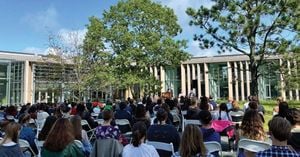A knife attack classified as terrorism occurred on Saturday afternoon, February 22, 2025, at near a market during a demonstration for Congo support, leaving one man dead and injuring several police officers. This tragic event unfolded in Mulhouse, France, close to the German border, and resulted from the actions of Brahim Abdessemed, a 37-year-old Algerian man known to authorities for being on the terrorist watchlist.
According to the local prosecutor Nicolas Heitz, the assailant attacked victims with a knife, shouting "Allah Akbar," just before attacking law enforcement officers. Tragically, he fatally injured one Portuguese man, aged 69, who intervened to protect police. Two police officers sustained severe injuries—one to the carotid artery and another to the torso. Three additional officers were injured, though their conditions are not life-threatening.
The prosecutor confirmed the incident is being investigated as murder with intent for terrorism. Following the attack, President Emmanuel Macron stated unequivocally, "There is no doubt it was an Islamist terrorist act." He expressed condolences to the victim’s family and the nation, affirming the government's unwavering commitment to combating terror. "The horror has seized our city," added Michèle Lutz, the mayor of Mulhouse, framing the attack within the broader issue of public safety and West's struggle against extremism.
The attack has unsettled the local community and reignited debate surrounding immigration and national security policies. Critics have pointed fingers at the government for allowing individuals like Abdessemed, who was under orders to leave France, to remain and commit such heinous acts. He had previously been convicted for instigation related to terrorism and was being monitored under judicial oversight.
This incident serves as yet another painful reminder of the persistent threat posed by radical Islamist extremism. Prime Minister François Bayrou expressed his sorrow, stating, "Fanaticism has struck again, and we are mourning; I extend my thoughts to the victims and their families with hopes for the injured's recovery."
Elements of the atmosphere during the attack have sparked outrage, particularly concerning the pending obligations Abdessemed had to leave France. His previous legal measures included being placed under surveillance during house arrest, which has raised questions about the efficacy of the existing security measures intended to prevent radicalization.
The senator from the far right, Jordan Bardella, characterized the assailant as not just failing to comply with legal standards but as being allowed to "commit the worst"—calling the tracking and monitoring of such individuals insufficient. Compounding these feelings of anger and helplessness is the proximity of this attack to Germany, where concerns of rising far-right sentiment and terrorism have been echoed following parallel incidents.
This knife attack, as yet unresolved, signals urgent needs for governmental action and community solidarity against growing threats. Macron emphasized, "The nation stands united; we must be vigilant and act decisively if we are to put these horrors behind us."
The aftermath has not only shocked residents but also provoked widespread discourse about measures the French government should undertake to protect its citizens. The response to this incident and the ability to prevent similar occurrences will remain under scrutiny as other European nations grapple with facing their own external and internal challenges.



